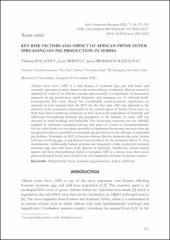| dc.contributor.author | Polaček, Vladimir | |
| dc.contributor.author | Mirčeta, Jovan | |
| dc.contributor.author | Prodanov-Radulović, Jasna | |
| dc.date.accessioned | 2021-12-27T09:00:52Z | |
| dc.date.available | 2021-12-27T09:00:52Z | |
| dc.date.issued | 2021 | |
| dc.identifier.issn | 0567-8315 | |
| dc.identifier.uri | https://repo.niv.ns.ac.rs/xmlui/handle/123456789/452 | |
| dc.description.abstract | African swine fever (ASF) is a viral disease of domestic pigs and wild boars and
currently represents a major threat to the swine industry worldwide. Disease control is
impaired by a lack of an effective vaccine and currently, it is dependent on biosecurity
measures in pig production, rapid diagnosis, and stamping out of infected herds.
Consequently, this swine disease has considerable social-economic significance on
national or even regional level. In 2019 for the first time ASF was detected in the
domestic swine population (backyards) in the central region of Serbia. From then on,
there have been continuous outbreaks of new cases in the population of domestic and
wild boars. Considering domestic pig population, in the majority of cases, ASF was
detected in small holdings and backyards. The biosecurity measures are not officially
required by veterinary regulation and are only given in a form of recommendations.
On the other hand, it is not always possible to implement biosecurity measures that are
recognized today as essential for sustainable pig production in the old type of industrial
pig facilities. Nowadays, in 2021, it became obvious that the domestic pig cycle, human
activities involving pigs, or pig-derived meat products are the dominant driver of virus
transmission. Additionally, human activities are frequently a risky connection between
domestic pigs and wild boars both directly or indirectly. Traditional, culture-related
aspects and facts that politicians failed to recognise ASF as a serious issue that causes
great economical losses were found to be very important obstacles in disease control | en_US |
| dc.description.sponsorship | This study was funded by Ministry of Education, Science and Technological
development of Republic of Serbia by the Contract of implementation and financing of scientific research work of NIV-NS in 2021, Contract No: 451-03-9/2021-14/200031 from 05/02/2020. | en_US |
| dc.language.iso | en | en_US |
| dc.source | Acta veterinaria | en |
| dc.subject | African Swine Fever | en_US |
| dc.subject | domestic pig production | en_US |
| dc.subject | Serbia | en_US |
| dc.subject | wild boar | en_US |
| dc.title | Key risk factors and impact of African Swine Fever spreading on pig production in Serbia | en_US |
| dc.title.alternative | Glavni rizici i uticaj širenja afričke kuge svinja na svinjarsku proizvodnju u Srbiji | en_US |
| dc.type | Article | en_US |
| dc.identifier.doi | 10.2478/acve-2021-0032 | |

